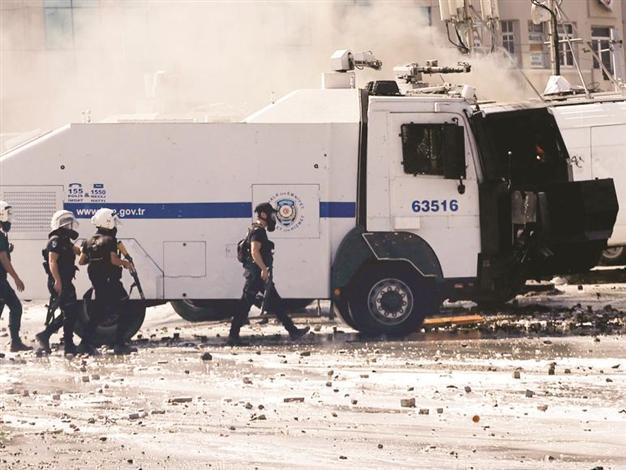Turkish anti-riot weapons market may boom amid Gezi Park protests
BURAK BEKDİL

A Turkish security official admitted that only in the first three days of protests alone in Istanbul, Ankara, İzmir and other big cities the police forces used an amount of tear gas and pepper spray equivalent to their annual consumption. REUTERS photo
Turkey’s anti-riot weapons and equipment market may soon enjoy a boom with dozens of agents proposing “smart solutions and advanced technology systems” to the government, as there is no indication that the two-week long civil unrest against Prime Minister Recep Tayyip Erdoğan’s government will fade out or subside any time soon.Industry sources said several foreign manufacturers and their Turkish agents were now preparing files containing various “solutions” based on advanced technology, including smart weapons and state-of-the-art electronic surveillance and jamming systems.
“The private security market has its eyes on the promising Turkish market,” one dealer said. He said the precision systems several companies would propose to the Turkish government were “classified and could not be detailed.”
Turkey has been hit by massive demonstrations since May 31 that grew out of anger over excessive police force against protesters holding a sit-in to prevent the uprooting of trees at Istanbul’s main Taksim Square. The demonstrations have since snowballed into Turkey’s biggest anti-government disturbances in several years, challenging Prime Minister Recep Tayyip Erdoğan’s power.
A defiant Erdoğan told a rally of party supporters on Sunday that “unless the protestors stopped their demonstrations the government would respond them in the language they would understand.”
“We are devising plans to combat the next wave of riots. A smart anti-riot strategy supported by smart equipment will be the pillar of our general policy to counter riots,” said one senior security official in Ankara.
Riots already a threat to Turkish government
The Turkish police had successfully dispersed every riot before the May 31 protests, using mainly water cannons from armored vehicles, tear gas and pepper spray. “Under the circumstances we may have to think of preemptive strikes and better electronic surveillance and intelligence [before any riot could take place],” the security official said.
According to defense analysts, the riots already have become an existential threat to Erdoğan’s government and must be tackled carefully. “The government faces a dilemma here. On the one hand it faces fearless crowds no gas or plastic bullets or excessive police force could disperse, and on the other it must walk on eggshells while countering this threat because any new attempts to violently crush the uprisings would spark major western outcry. I think Erdoğan’s government already has lost a lot of credibility before its western allies. Erdoğan definitely needs to fight the dissidents smartly,” said one Ankara-based defense strategist.
Human Rights Watch urged Erdoğan’s government to “end police violence and excessive use of force against protesters across Turkey” on June 3.
U.S. Vice President Joe Biden said June 4 that “only Turks can solve the problem of anti-government protests sowing unrest in Turkey.” Biden said the U.S. was concerned and was not indifferent to the outcome. And Secretary of State John Kerry said June 3 that the administration was very concerned about a crackdown on protesters and was urging Turkey to exercise restraint. He said the U.S. was troubled by reports of excessive force by the police and deeply concerned by the number of people injured.
The Turkish security official admitted that only in the first three days of riots in Istanbul, Ankara, Izmir and other big cities the police consumed an amount of tear gas and pepper spray equivalent to its annual consumption. “On the one hand there is a need for immediate replenishments and on the other, politically speaking, gassing [protesters] has proved to be an instrument that is politically risky,” he said.
According to Customs Minister Hayati Yazici, Turkey imported $21 million worth of anti-riot gas from the United States and Brazil in the last 12 years.
A defense procurement official said that the “new situation” made sure the police force would act quickly to procure whatever instruments it saw fit to crackdown on future riots. “Including gas,” he said, “and we expect them to rush to buy more armored vehicles -- all possible anti-riot types.”
Interestingly, the Turkish Parliament’s interior commission passed a draft bill June 3 that authorizes the police force to import heavy weaponry, ammunition, equipment and vehicles (including tanks, according to one government lawmaker). That bill must be debated and voted at parliament’s general assembly before taking effect.
















